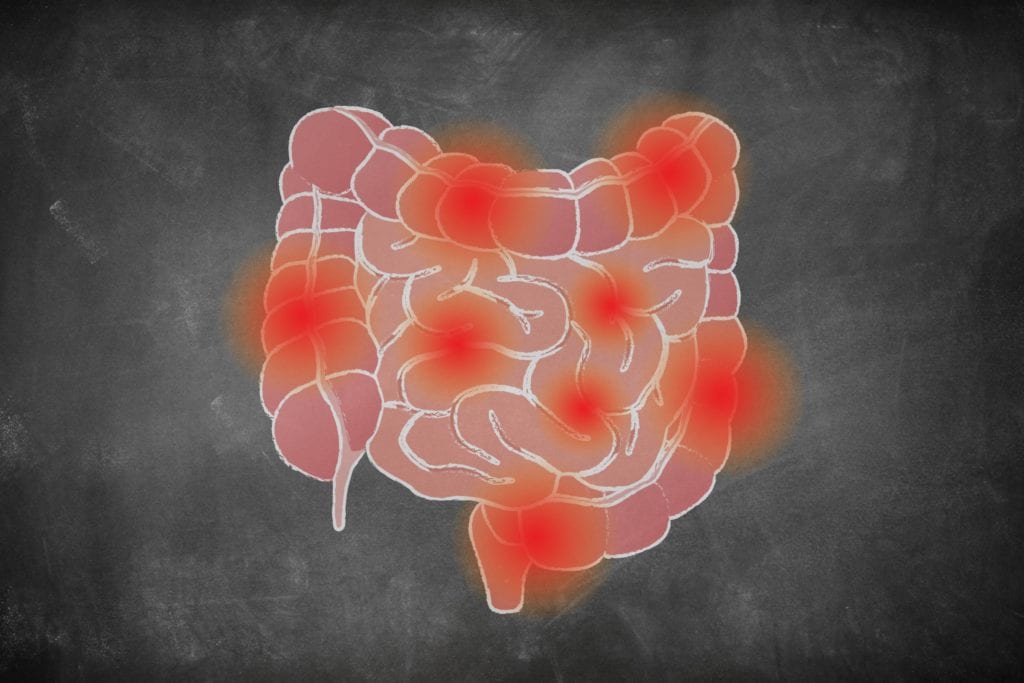

Crohn’s disease is a type of inflammatory bowel disease (IBD), along with ulcerative colitis, that is caused by an overactive immune system. The condition is chronic, but staying informed about its triggers and treatments can keep Crohn’s disease symptoms and long-term complications to a minimum.
1. It’s caused by inflammation
With an IBD like Crohn’s, the immune system doesn’t act as it should. Instead of attacking only foreign invaders like viruses and bacteria, immune system agents turn on healthy cells in the digestive tract, which triggers inflammation and its associated symptoms.
2. But no one knows why the inflammation starts
Scientists haven’t pinned down a specific cause of Crohn’s, but it seems to have a genetic component. It runs in families and among people of Ashkenazi Jewish descent. Environment also appears to play a role, with the disease occurring more in urban areas and industrialized countries.
3. Symptoms vary from person to person
Abdominal pain is the most common symptom of Crohn’s disease, but exactly where that pain occurs depends on which area of the digestive tract is affected. Crohn’s commonly affects the lower part of the small intestine (called the ileum) and the start of the large intestine (called the colon). However, Crohn’s can affect any part of the GI tract, including the mouth, esophagus, and stomach.
Other common Crohn’s symptoms include diarrhea, bloody stool, weight loss, and fatigue.
4. It has an early onset
Most people with Crohn’s disease are diagnosed between age 15 and 30, although the symptoms can start at any age.
5. There’s no cure, but there is good treatment
Crohn’s disease is chronic, but medications can ease the inflammation to make the symptoms more manageable. Crohn’s can be debilitating and have a big impact on your quality of life, but in most cases it isn’t fatal.
6. Crohn’s can have serious complications
The complications of Crohn’s disease can be life-threatening if you don’t get proper medical attention. Some of the most dangerous possible outcomes include fistulas, which are ulcers that open up the intestinal wall and create a tube-like passage to another organ; strictures, which occur when the intestines narrow and sometimes can get completely blocked; and abscesses, or infected sores.
Surgery can remedy the immediate problem, but it won’t heal Crohn’s disease for good, says Glenn H. Englander, MD, gastroenterologist in West Palm Beach, Florida. “You don’t get rid of [Crohn’s disease] by cutting,” he says.
7. It’s not the same as ulcerative colitis
Crohn’s disease and ulcerative colitis are both types of inflammatory bowel disease and have similar symptoms, but they’re separate diseases. UC only affects the large intestine and rectum, while Crohn’s can cause inflammation anywhere in the GI tract, from the mouth to the rectum.
Plus, UC tends to work its way through the colon, while Crohn’s is patchier and doesn’t stay on the surface level, says Nana Bernasko, DNP, gastroenterology expert with the American Gastroenterological Association. “Crohn’s disease goes deeper in the tissue vs. what you see with ulcerative colitis,” she says.
8. Avoiding too much fiber might be a good idea
When Crohn’s disease leads to strictures, those tight spaces can make it hard for certain foods to pass. “High-fiber foods don’t necessarily digest and can plug the intestines because it’s narrowed,” says Dr. Bernasko. Your doctor might ask you to stay away from foods like beans, whole-grain products, nuts, and popcorn.
9. You can still have a baby
“A lot of female patients think because they have IBD, they can’t have kids,” says Dr. Bernasko. You can still have Crohn’s and have a healthy pregnancy. What’s more, even though Crohn’s disease appears to have a genetic component, it doesn’t guarantee your kids will have it too — chances are higher that they won’t.
10. Untreated, Crohn’s disease could lead to cancer
People who have had Crohn’s disease for at least eight years are at a higher risk of having colorectal cancer. The inflammation makes cells in the colon turn over quickly, so there’s a higher possibility of irregular cell growth. Keeping up with colon cancer screenings can catch it early, and receiving Crohn’s treatment can quiet down the turnover to reduce the risk. Your doctor will advise at what age to start colon cancer screenings and how often to have them if you’ve been diagnosed with Crohn’s disease.
11. For the most part, you can’t prevent Crohn’s disease
If you’re diagnosed with Crohn’s, don’t blame yourself. Don’t feel regret for anything you ate or did in the past. “Some people actually take blame for their disease, and it is not anything they could prevent,” says Dr. Bernasko. Smoking is the only known preventable factor in reducing the risk of Crohn’s disease.





